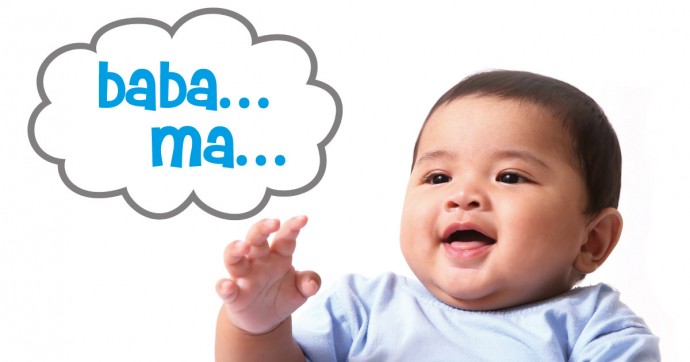Have you noticed that your 3-month old baby recognised your voice and smiled whenever he saw you? By 4-6 months, he started to babble, laugh, follow sounds with his eyes, and pay attention to music. On his first birthday, he finally uttered ‘Ma’ or ‘Ba’ to refer specifically to you, and this painted a sweet and unforgettable memory in your journey of child upbringing.
What are speech and language?
Speech: How we say sounds and words, including articulation, voice, and fluency
Language: How we use words to exchange information, including verbal, nonverbal and written communication.
What can go wrong?
While all children reach developmental milestones at their own pace, it is cause for concern if they significantly miss their milestones. A child is said to have a speech and language delay (sometimes called speech delay or language delay) when he does not acquire speech and language skills appropriate for age during early childhood.
Speech and language delays are different from, but closely linked to speech and language disorders. Generally, a delay is a description for a younger child during early developmental period; however, it is said to be a disorder if it persists beyond early childhood and affects the child’s function.
Speech and language disorders
A speech (sound) disorder is when a child has problems producing speech sounds properly at the expected age, making speech difficult to understand. Meanwhile, stuttering (Childhood Onset Fluency Disorder) refers to a condition when sounds, syllables, or words are repeated or prolonged, disrupting the normal speech flow. In both conditions, the child can understand or express ideas in words and phrases, but his utterance may sound incomprehensible, especially to strangers.
Meanwhile, a language disorder is when the earlier speech and language delays does not go away as the child grows up (some children with these delays do catch up and are known as ‘late talkers’). He struggles to understand what others are saying (receptive language) or has trouble sharing his thoughts (expressive language). For example, he can pronounce words well, but is unable to make two-word phrases by 2 ½ years old. It is not uncommon to see a child with a language disorder also have speech sound problems.
Early detection is crucial
It can be hard for parents to distinguish if their child is just a little slow to reach a speech or language milestone, or if there is a problem that needs medical attention.
Refer to your child’s paediatrician immediately if you are concerned or see the following signs:
Red flags for speech and language delay / language disorder (later on)
Around 12 – 15 months
- Does not understand the name of certain common objects, e.g. ‘bottle’, ‘(toy) car’
- Does not refer to you specifically using ‘ma’ or ‘ba’
- Does not have any meaningful utterance
Around 18 – 21 months
- Does not understand familiar phrases, e.g. ‘give me a kiss’, ‘hug daddy’, ‘stop that’
- Does not point to body parts
- Does not have or has very limited vocabulary, e.g. ‘cat’, ‘car’
Around 24 months
- Does not seem to understand simple instructions or questions, e.g. ‘Get your shoes’, ‘Want a drink?’ or ‘Where’s Daddy?’
- Does not say at least 25 different words
- Does not combine two words together, e.g. ‘drink milk’, ‘go out’
- Can only imitate speech and action, does not say words spontaneously
Around 36 months
- Does not seem to understand longer instructions or questions, e.g. ‘Get your shoes and put them in the box’ or ‘What do you want to eat for lunch today?’
- Does not combines words into longer phrases, e.g. ‘want eat biscuit’, ‘help me mummy’
Red flags for speech disorder
- Sounds very immature for his age, i.e. he uses only a few speech sounds or patterns
- Does not pronounce words the way you would expect for his age
Red flags for stuttering
- A sound, part of a word, word or phrase is repeated over and over, e.g. ‘A a a and I want that one’, ‘And and and I want that one’
- A sound is stretched out, e.g. ‘Aaaaaaaaaaand I want that one’
- He tries to speak and no sound comes out
- Eye blinking and grimacing while talking
What happened?
A speech-related problem may be caused by oral impairment like problems with the tongue or palate. It can also be caused by oral-motor problems whereby there is a problem in the brain area linked to speech, making it hard to coordinate the lips, tongue, and jaw to produce sounds. For language delay or disorder, it may be associated with other conditions such as brain injury and autism spectrum disorder.
In addition, speech and language problems may also be caused by hearing problems (commonly due to congenital hearing impairment, chronic ear infections or glue ear). There is also strong evidence that excessive screen time (time spent on watching TV or gadgets) and lack of stimulation can lead to these delays. Furthermore, they may be part of more global problem – developmental delay or intellectual impairment.
Early detection and early intervention is the utmost priority for speech and language delays. The wait-and-see attitude can be detrimental to the child’s future. Parents should be aware and consult a paediatrician immediately if they have any concerns as these could impact their child’s growth and development.
An educational contribution by Malaysian Paediatric Association.



Comments